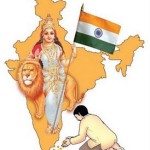After the great King Sagara, the time has come to study the life of yet another exquisite Royal Personality in Bharat’s great tradition. Not just men, but inspirational women too, have set an example on how to balance personal dreams and aspirations with familial and national duties.
Our next Personality in our Continuing Series is none other than the legendary Savitri.
Background
More than just a timeless, girl-saves-guy love story, Savitri & Satyavan is nidarsana katha in its highest form.
Savitri is among the five Satis of Sanatana Dharma and is held up as being a role model for pativrata. The story of Savitri and her husband Satyavan, first occurs in the Mahabharata in the Vana Parva. Her story is recited by sage Markandeya when Yudhisthira asks him if there is any woman who is as devout a wife as Draupadi.
Princess Savitri was the daughter of the King of Madra, Asvapati, and his wife, Queen Malavi. Asvapati was a childless ruler, and as he grew older he began to feel anxious that he did not have an heir to succeed him. He thus undertook all sorts of penances and prayed to the goddess Savitri, residing in the sun, to bless him with a son to carry on his line. 18 years of hard penance earned him the goodwill of the goddess who appeared to him and told him he will be blessed with a spirited daughter. Soon, a daughter was born to him and he named her Savitri in honour of the goddess who blessed him.
Savitri grew into a beautiful young woman and her beauty was so bedazzling that suitors got intimidated by her. Hence no one came forth to ask for her hand in marriage. Finally, her father told her that since no one was coming forth to marry her, she must go out and find a husband for herself. She set off on the search for a husband, and soon fell in love with Satyavan, the son of the blind and impoverished king Dyumatsena. This ruler had been exiled from his kingdom (Salva desa) and was living as a hermit in the forest.
Savitri’s father was very displeased with her choice and wanted her to make another choice, but she refused to change her mind. Her father wished to hand over the kingdom to the groom so that his daughter would have a comfortable life. However, she refused this too and was adamant that she would stay in the forest with her husband and his parents.
But there was something even more dire than all the previous issues with the choice that she had made. Satyavan was destined to die one year from the day they got married. This was unbearable for Savitri’s father, who tried to dissuade her from going ahead with her plan. But Savitri, being the ever independent minded person said to him, “Once only one gets one’s inheritance, once only a daughter is given away and once only a father says, ‘I give her”’ These are three ‘once only’ acts. I have once chosen my husband, long-lived or short-lived, virtuous or wanting in virtue, I have chosen my husband once, and I shall not choose for the second time”. Faced with such strong resolve, Savitri’s father could only give in to his daughter’s wishes. Thus were Satyavan and Savitri married.
Savitri had not the slightest hesitation in giving up her royal robes and riches for the simple and humble attire of a hermit’s wife. She settled into her new life as wife and daughter-in-law and won the hearts and minds of all in that hermit’s abode, with her conduct. However, she never lost sight of the fact that in a year from the date of her marriage she was destined to lose her husband. She kept close watch on the count of days passing by and when there were but four days left to the date of Satyavan’s death, she undertook a fast for three days and three nights in order that her husband might be spared.
Achievements
- Saved her husband’s life
- Restored her father-in-law’s health and wealth
- Safeguarded her father’s future and her native kingdom’s security
On the appointed day of his death, when the day was halfway through, Savitri’s in-laws told her that she should break her fast. But Savitri refused, saying that she would eat only after sunset. Satyavan, in the meanwhile, had picked up his axe and was going out of the hermitage when Savitri came to him and told him that she would accompany him into the woods. Satyavan tried to dissuade her from accompanying him, telling her that her fast of the past three days would have tired her out. This, however, did not deter Savitri, and she followed him into the forest.
As Satyavan was working, he suddenly felt his head beginning to ache and began to sweat profusely. He felt so weak that he felt unable to stand. Savitri immediately took him in her arms and sat down, letting his head rest in her lap as he began to collapse. Yama, the god of death (and Dharma) appeared before her said that Satyavan’s life on this earth had reached an end and he was going to take his lifebreath away. So saying, he took a thumb length of Satyavan’s sookshma sareera even as his material body lay lifeless on the ground, and started proceeding southwards.
Savitri began to follow Yama and seeing her follow him, Yama asked her why she was following him. This was Savitri’s answer. She said, “I must go wherever my husband goes. It is established by the eternal ancient law that the wife should always follow her husband wherever he goes or wherever he is taken. By virtue of the austerities I have practised, and by the power of my love for my husband, as also the potency of my vow, and by your grace too, unimpeded I would go.” This was the Pativrata Dharma (one echelon of Stree Dharma) that she had been taught and what she lived by. Savitri then began to converse with Yama in her most elegant and refined manner, which gladdened the heart of Yama though he disapproved of her accompanying him. At last, her cultured and refined behaviour wore down his defences and he told her she could demand a boon of him as long as it was not the life of her husband. She demanded that her father-in-law’s eyesight be restored and that he be allowed to become “strong and shining in spirit like the sun and the fire.” That boon was granted and yet Savitri continued to walk with Yama.
After a while, seeing she had no intention of turning back, Yama inquired of her why she was still trailing him and whether she wasn’t tired. To that, the ever virtuous Savitri replied, “Why should I be tired when I am with my husband? I go wherever he goes. Besides, even a solitary meeting with the great is desirable; it never goes in vain. It is always beneficial to be in good company.” Now, Yama is not a welcome entity, normally, because he is the harbinger of death and hence grief. But Savitri living by her Dharma of seeing the goodness and greatness in everyone and stating that, made the normally bad tempered Yama feel honoured.
He asked her to name a second boon that did not involve bringing her husband back to life and she promptly asked that her father-in-law’s kingdom be restored to him. That wish was also granted and they continued on their way. In her pleasing manner, Savitri thus received additional boons; the third was that her own father should be blessed with a hundred sons, the fourth that she herself would be blessed with a hundred sons. Yama smiled, and said so be it.
As Yama began walking away, Savitri again followed him. Finally enraged, Yama asked how Savitri could continue to follow him after he had blessed her with so much. The clever Savitri then said “Oh Yama deva, you have graciously blessed me with a hundred sons, but how can I conceive them without my husband?“. Realising he had been out-witted, the Deva of Death praised this wise and devoted wife as an example for all time, and happily told her to ask for final boon (but this time he omitted his previous injunction against asking for Satyavan). She naturally asked for Yama to return her husband to life, which he did. Yamadeva blessed Savitri and Satyavan, and disappeared.
In all the above chronology of the wishes expressed by Savitri, we see her selflessness shining through. Though her burning desire was to see her husband brought back to life, she was always aware of her duties a as a daughter-in-law and daughter to the elders that made up her family. Her concern for her in-laws and her own parents was placed before her own concerns and this alone was enough for Yama to understand the depth of her love for her husband and her deep understanding of the values that a woman has to uphold and live by. Both women and men are expected to be unselfish under Dharma.
What is the lesson to be drawn from this story?
The lesson of Savitri is that even the Gods bow before a woman who is forever protecting her husband and safeguarding his well-being. What she achieved through wisdom and prayer, other women may also do through the sword and strategem. But more than that, Savitri is a model for how husbands and wives are expected to be devoted to each other—that is the true driver of love.
We all are governed by the karmas we have accumulated over our many lifetimes and hence our destiny is pre-ordained. But, while that is the broad grand plan, how we respond to them and the dignity and unselfishness with which we conduct our lives, determines who we really are.
However, there are no short cuts or quick fixes to achieve it. Only by upholding dharma in the highest possible way and living life according to the Dharmic principles prescribed for each one of us, as daughters, women, wives, daughters-in-law, mothers and so on (in the case of women, with a similar list being there in the case of men), can we hope to overturn destiny. The greatness of Dharma lies in the fact that there is a possibility to make changes in our destiny but that it requires great will and tapasya to actually be able to accomplish it. The most meaningful lives, for both women and men (yes, I mean you too, boys..), are those that are lived for others. The selfish existence is the empty existence. Savitri stands as a shining example for all time. She was an empowered woman who charted her own course in life, but while she asserted her rights, she never forgot that rights go together with duties.
Such selfless women are rarely ever matched by men, and fewer still are the stories where the girl saves the guy. Savitri is one such heroine who commands our respect and admiration.
Legacy
Contrary to modern debutantes, Savitri is a strong character and embodiment of Bharatiya Stree Shakti. Neither passive nor aggressive, she is assertive. She is intelligent, knows both her duties and her rights, and is not afraid to live up to the former while asserting the latter. But she does so with maryada (courtesy & propriety)—this is the true mark of culture and refinement.
Like the Great King Sagara, whether she too is Legendary or not, Savitri is an example and exemplar of Dharma. She exemplifies the very concept of ardhangini, which demonstrates that women cannot and should not be trod and trampled upon, but have 1 half of the share of responsibilities and rights in society. They are not worth only half of men like other cultures, but in fact the other half of men, and entitled to their share of respect and influence in society. Savitri personifies precisely how real strong women command respect.

Savitri is an extremely wise woman from our epics who outwitted Yama himself and brought her husband Satyavan back to life through her intelligence. This was truly the ultimate girl-saves-guy love story. She is revered as a pativrata, as one of the pancha-satis and “Women worship Savitri by tying colored sacred threads to the Vata (banyan) tree as part of observance during the rainy season in many parts of India, the occasion being called Vatasavitri”. [2] This festival is to this day honoured, so that women too can hope to gain the wisdom and character of such a complete woman.
Beyond movies in languages such as Hindi and Malayalam, the English composer Gustav Holst was even inspired by the story to write an opera on it in 1916. What inspires even foreigners, Bharatiyas take for granted. From the ancient Puranas to modern Popular culture, Savitri of Madra is one of the dazzling lights of our sanskriti, who attained eternal fame, and even gave the very name “Sati-Savitri”.
It may be a common joke in today’s jaded, pub-hub, dance club age for “liberated” girls to say “don’t be such a Sati-Savitri!“. But if Savitri means being an empowered woman who chose her own husband, saved his life, and secured the happiness of her family, in-laws, and nation, maybe we in fact should be.
References:
- Sarma, Bharadvaja. Vyasa’s Mahabharatam. Academic Publishers. 2008. pp. 329–336. Vana Parva
- SarDesai, D.R. India: The Definitive History. Westview: Boulder, Colorado. 2008







